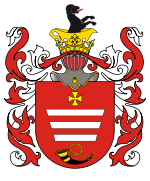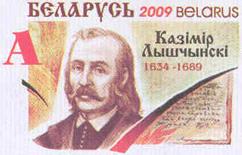Kazimierz Łyszczyński
| Kazimierz Łyszczyński | |
|---|---|
| Nascimento | 4 de março de 1634 Łyszczyce |
| Morte | 30 de março de 1689 (55 anos) Varsóvia |
| Residência | República das Duas Nações |
| Nacionalidade | polonês |
| Cidadania | República das Duas Nações |
| Progenitores |
|
| Alma mater | |
| Ocupação | juiz, filósofo, escritor, militar |
| Principais trabalhos | De non existentia Dei |
| Movimento estético | ateísmo |

| |
| Religião | nenhuma (ateu) |
| Causa da morte | decapitação |

Kazimierz Łyszczyński (Łyszczyce, 4 de março de 1634 — Varsóvia, 30 de março de 1689), foi um filósofo, escritor, nobre, latifundiário e soldado polonês. Inicialmente treinado como um jesuíta, encontrou muitas contradições nos argumentos favoráveis à existência de Deus quando leu Theologia Naturalis, de Henry Aldsted. Perdeu sua fé e escreveu um tratado intitulado De non existentia Dei ("A não existência de Deus", em latim), o que lhe rendeu a acusação de ateísmo, grave crime à época. Eventualmente, foi considerado culpado e executado publicamente pela Igreja Católica. Teve sua língua e boca arrancadas, as mãos queimadas e a cabeça cortada; após a decapitação, seu corpo foi então jogado na fogueira onde também queimaram seus escritos que foram considerados hereges. Seu julgamento foi criticado e repudiado, e o caso foi considerado um exemplo de "assassinado religioso legalizado".[1][2][3][4]
Referências
- ↑ Aleksander Gieysztor, et al. 1979, History of Poland, p. 261. "A Lithuanian nobleman, Kazimierz Lyszczynski, was even beheaded for his alleged, or real, atheism (1689)"
- ↑ Jerzy Kłoczowski, 2000, A History of Polish Christianity, p. 155. "The most famous episode was the sentencing to death of Kazimierz Lyszczynski, a nobleman accused of atheism, by the Sejm court in 1689."
- ↑ The Spirit of Polish History by Antoni Chołoniewski. Traduzido por Jane (Addy) Arctowska. The Polish Book Importing Co., inc., 1918. p. 38. "The execution of the nobleman Lyszczynski, accused of atheism, religious murder ordered by the Diet of 1689, remained an isolated case."
- ↑ Skorobohaty, Walerjan (1840), Historical Sketch Of The Rise, Progress And Decline Of The Reformation In Poland V1. University of Michigan, pp. 412–415, Chapter XV. "Cazimir Lyszczynski, a noble and landowner of Lithuania, a man of a very respectable character, was perusing a book entitled Theologia Naturalis, by Henry Aldsted, a Protestant divine, and finding that the arguments which the author employed in order to prove the existence of divinity, were so confused that it was possible to deduce from them quite contrary consequences, he added on the margin the following words — “ergo non est Deus,” evidently ridiculing the arguments of the author. This circumstance was found out by Brzoska, nuncio of Brest in Lithuania, a debtor of Lyszczynski, who denouned him as an atheist, delivering, as evidence of his accusation, a copy of the work with the above-mentioned annotation to Witwicki, bishop of Posnania, who took up this affair with the greatest violence. He was zealously seconded by Zaluski, bishop of Kiod, a prelate known for his great learning and not devoid of merit in other respects, which however proved no check to religious fanaticism. The king, who was very far from countenancing such enormities, attempted to save the unfortunate Lyszczynski, by ordering that he should be judged at Vilna; but nothing could shelter the unfortunate man against the fanatical rage of the clergy represented by the two bishops; and the first privilege of a Polish noble, that he could not be imprisoned before his condemnation, and which had theretofore been sacredly observed even with the greatest criminals, was violated. On the simple accusation of his debtor, supported by the bishops, the affair was brought before the diet of 1689, before which the clergy, and particularly the bishop Zaluski, accused Lyszczynski of having denied the existence of God, and uttered blasphemies against the blessed Virgin and the saints. The unfortunate victim, terrified by his perilous situation, acknowledged all that was imputed to him, made a full recantation of all he might have said and written against the doctrine of the Roman Catholic church, and declared his entire submission to its authority. This was, however, of no avail to him, and his accusers were even scandalized that the diet permitted him to make a defence, and granted the term of three days for collecting evidence of his innocence, as the accusation of the clergy ought, in their judgment, to be sufficient evidence on which to condemn the culprit. The fanaticism of the diet was excited in a most scandalous manner by the blasphemous representation that divinity should be propitiated by the blood of its offenders. The diet decreed that Lyszczynski should have his tongue pulled out, and then be beheaded and burnt. This atrocious sentence was executed, and the bishop Zaluski himself gives a relation of what he considered an act of piety and justice! The king was horror-struck at this news and exclaimed that the Inquisition could not do any thing worse. It is necessary, on this occasion, to render justice to Pope Innocent XI., who, instead of conferring a cardinal’s hat on the bishop of Posnania, bitterly censured this disgraceful affair."
- Nascidos em 1634
- Mortos em 1689
- Homens
- Ateus da Bielorrússia
- Ateus da Lituânia
- Ateus da Polónia
- Escritores da Bielorrússia
- Escritores da Lituânia
- Escritores da Polônia
- Escritores em latim
- Filósofos ateus
- Filósofos da Bielorrússia
- Filósofos da Lituânia
- Filósofos da Polónia
- Nobres da Bielorrússia
- Nobres da Lituânia
- Nobres da Polônia
- Militares da Bielorrússia
- Militares da Lituânia
- Militares da Polónia
- Pessoas executadas por decapitação
- Pessoas executadas por heresia
- Pessoas executadas pelo fogo


